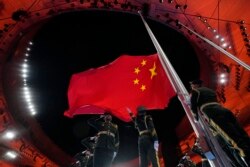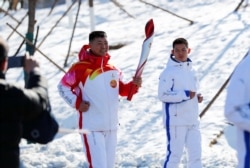On February 3, Chinese Foreign Minister Wang Yi met with Russian counterpart Sergey Lavrov in Beijing on the eve of the 2022 Winter Olympics.
Both sides criticized the diplomatic boycott of the Olympics over China’s human rights record.
Russia's Foreign Ministry called the boycott “another proof of attempts to politicize sports and a blatant violation of the spirit of the Olympic Charter.”
China’s Foreign Ministry released a similar statement.
"Both parties unanimously agreed to promote the Olympic spirit, jointly oppose attempts to politicize sports and stand together to support the success of the Winter Olympic Games in Beijing," it said.
Although Beijing claims to oppose attempts to politicize sports, China used the Olympic torch — one of the most recognizable symbols of the games — in what critics allege was a pure propaganda exercise.
On February 2, China chose Col. Qi Fabao, a regimental commander from the Xinjiang military command of the People’s Liberation Army (PLA), as one of the first of some 1,200 people to carry the Olympic torch.
Qi led PLA forces during a bloody June 15, 2020, border clash with Indian troops in the Galwan River Valley, a disputed Himalayan border region. Qi received a serious head injury during the melee.
The Global Times, a mouthpiece of the Chinese Communist Party (CCP), described Qi as the “Galwan Valley border clash hero.”
The newspaper noted that four-time Olympic speed skating champion Wang Meng and Qi “made military salutes to each other” when Wang handed Qi the flame.
The incident caused India to join the diplomatic protest, first announced by the United States in December 2021.
"It is indeed regrettable that the Chinese side has chosen to politicize an event like the Olympics,” India’s External Affairs Ministry spokesperson Arindam Bagchi said.
He added that India would not send its charge d’affaires in Beijing for the opening or closing ceremonies.
India’s English-language Tribune newspaper reported that Qi’s participation in the torch relay “would not have come to light had the Chinese government-owned Global Times not released his images along with an announcement that Qi ‘sustained head injuries while fighting bravely in the Galwan Valley border skirmish with India’.”
James Risch, a Republican U.S. senator from the state of Idaho and ranking member of the Committee on Foreign Relations, also attacked the decision to pick Qi as a torchbearer.
"It's shameful that Beijing chose a torchbearer for the Olympics2022 who's part of the military command that attacked India in 2020 and is implementing genocide against the Uyghurs. The US will continue to support Uyghur freedoms and the sovereignty of India,” Risch said on Twitter.
The White House cited “ongoing genocide and crimes against humanity in Xinjiang and other human rights abuses” as the reason behind the U.S. diplomatic boycott.
Some U.S. allies, including Australia, the United Kingdom and Japan, are also taking part in the boycott.
Xinjiang, a region in northwestern China, is home to Uyghurs and other Muslim minorities. Critics say China has subjected the Uyghurs to forced labor, mass incarceration and other rights abuses that are tantamount to genocide.
Also on February 2, The Klaxon, an Australian investigative newspaper, reported that Beijing is “aggressively censoring reporting on the deaths” in the Himalayan border clashes.
The Klaxon cited a report prepared by social media researchers, titled “Galwan Decoded,” stating that “at least 38 PLA troops … were washed away and drowned” during the incident.
Immediately after the incident, India’s army said 20 of its soldiers were killed, including a colonel.
Beijing initially refused to report casualties. In February 2021, China conceded that four of its soldiers had died.
China has long maintained that India bears full responsibility for the fighting. India claims the melee was “pre-meditated and planned” by China.
China has released propaganda photographs of what it claims were Indian soldiers captured during the Galwan clashes.
Meantime, The Hill newspaper, citing Chinese state media, reported that more than 100 Chinese athletes and coaches from China’s Olympic team gathered on Tiananmen Square “to take an oath to fight for China’s victory.”
Citing sources on the ground, the newspaper said the athletes chanted distinctly political slogans, including: “Throw caution to the wind to repay the Leader (Xi Jinping), and follow the General Secretary (Xi Jinping), and move together to the future.”
Further politicizing the Olympics, President Xi met with Russian President Vladimir Putin on February 4 to reaffirm their ties and air a number of grievances against the West.
In a lengthy joint statement, both sides said they oppose further expansion of the North Atlantic Treaty Organization, "color revolutions" and "the independence of Taiwan."
Reuters noted that China "mixed politics and sport with a boldness unseen since the Cold War" in heralding "a new alliance" with Russia just hours before the Olympics opening ceremony got under way.
Ironically, both sides affirmed "their strong mutual support" for "state sovereignty and territorial integrity," while "opposing the intervention of external forces in their internal affairs."
Russia, which continues to occupy Moldovan, Georgian and Ukrainian territory, has moved an estimated 125,000 troops and heavy weapons to Ukraine's border.
The West has warned Russia against a larger-scale invasion of Ukraine. Moscow denies that the troop buildup near Ukraine, or deployment of soldiers and weapons to neighboring Belarus, mean Russia is planning for war.
China has called U.S. claims that Russia's actions will lead to war "unfounded," based on Russia's declaration "that it has no plans to launch military action."

